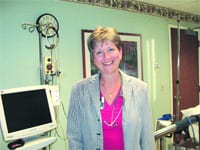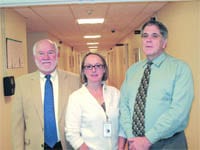After the Attack Women with Cardiac Disease Take Heart from Support Group
As a cardiopulmonary nurse practitioner at Baystate Franklin Medical Center for the past six years, Kathryn Aubry-McAvoy is no stranger to the causes, symptoms, and effects of heart disease.
Two years ago, she suffered a heart attack anyway, proving, if nothing else, that cardiac disease, America’s number-one killer, often doesn’t discriminate between those in poor health and those — like Aubry-McAvoy — who are otherwise well.
“It’s important for people to know that this can happen to anybody,” she told The Healthcare News. “Everyone has to pay attention to their risk factors and symptoms.”
Now, she’s doing her part to help women do just that, launching a support group last year that offers education, moral support, and a needed dose of fun to heart-disease sufferers and fellow heart-attack survivors.
It’s called Heart to Heart, and the group now averaging about 15 women per session — meets at Baystate Franklin on the third Tuesday of every month from 4:30 to 6 p.m. It’s open to any heart disease survivor, regardless of whether they’ve been treated at the hospital.
“It’s mutual support,” she said. “That’s the main benefit. It’s amazing that the person seated next to me has been through the same things I’ve been through. It normalizes things: ‘I’m all right. Someone else has been through the exact same thing.’ One woman who recently had surgery said it was good for her to hear how long other women took to feel themselves again after surgery.
“It’s been a lot of fun, and it’s going well,” she continued. “I know personally that there’s a need for this; my function is to facilitate the group, but it’s also wonderfully supportive for me as a patient. We all have the same problems, and we talk about the same things.”
Taking Heart
Each meeting of Heart to Heart features a different theme, covering such topics as stress reduction, women and aging, exercise, food and nutrition, medications, the financial impact of living with heart disease, and how families are affected.
Most meetings also feature a guest speaker, said Aubry-McAvoy. At one session, a YMCA fitness director discussed the importance of exercise to cardiovascular fitness, and at another, a pharmacist from Baystate Medical Center talked about cardiac medications and answered questions about their benefits and risks. “At one meeting, we shared heart-healthy recipes and made a cookbook, and we brought samples.
“I really want women to be able to support each other in a fun way,” she continued.
“Heart disease is frightening, but it doesn’t need to prevent you from leading a normal, healthy life.” In fact, she said, having a heart attack can often lead women to a lifestyle that’s even healthier than before, and support groups like hers provide an opportunity to unite around common experiences.
Not that all heart attacks are the same. “Some are sudden and intense,” she said. “People describe it as a crushing chest pain, like an elephant on their chest. But other times, the symptoms are more subtle, and this is often more true with women. It may start slowly with mild pain, which goes away and comes back. Some women complain of shortness of breath or fatigue — they’re just not feeling well.”
Typically, she said, symptoms include chest pain that lasts for more than a few minutes, or a feeling of squeezing, pressure, or fullness. The subtlety of the symptoms, she said, is even more dangerous in women than in men, because women are more likely to equate seeking help with being bothersome. “I think that’s a typical woman thing.”
Even in Aubry-McAvoy’s case, with a pain so piercing and intense that she knew something was wrong, she kept telling herself it wasn’t an attack. “I thought, it’s not my heart. I have no risk factors. It can’t be my heart. Yet I knew that I had to call 911, and it’s a damn good thing I did.”
She was treated in the Baystate Franklin ICU and transferred to Baystate Medical Center afterward for angioplasty and stenting. The work of the doctors kept her from becoming one of the 450,000 people who die each year from heart disease.
In fact, nearly twice as many women in the U.S. die of heart disease, stroke, and other cardiovascular diseases as from all forms of cancer combined, including breast cancer. In addition, women who have survived a heart attack are at significantly higher risk of another one; 43{06cf2b9696b159f874511d23dbc893eb1ac83014175ed30550cfff22781411e5} of women age 40 and over who have suffered an attack will have another one or fatal coronary heart disease within five years, and 22{06cf2b9696b159f874511d23dbc893eb1ac83014175ed30550cfff22781411e5} who survive a first stroke will have another within five years.
Bright Futures
That’s where Heart to Heart plays another key role — in providing not only moral support and shared courage to face the future after a heart-disease diagnosis, but helping the women who attend sessions live healthier lives.
They learn about the risk factors that are unchangeable — age, family history, and diabetes among them — but also about the ones they can alter, such as smoking, high cholesterol, and obesity.
“They learn that we begin to build up cholesterol at a young age,” said Aubry-McAvoy. “The rates of childhood obesity are amazing; we’re seeing younger people than ever with serious heart disease.”
And by learning how to control such factors in their own lives, she said, participants feel more in control. In most cases, “it’s going to be OK,” she said, “but you don’t realize that until you talk to people who have been through it.”
Judging by the response so far, the women like what they’re hearing — and sharing.
“Well, they keep coming back,” Aubry-McAvoy said. “We have a lot of fun, and we laugh a lot. At the same time, it teaches you to understand the experience of a heart attack — even though there’s nothing like the experience.”
Sometimes, staying healthy — and avoiding such a life-altering event — begins with just a few words from the heart.v
Funds for Heart to Heart were provided through a grant from the Women’s Health Care Fund at Baystate Franklin, established with money raised through the annual Spirit of Women Road Race. For information on attending a session, call (413) 773-2397.




Comments are closed.